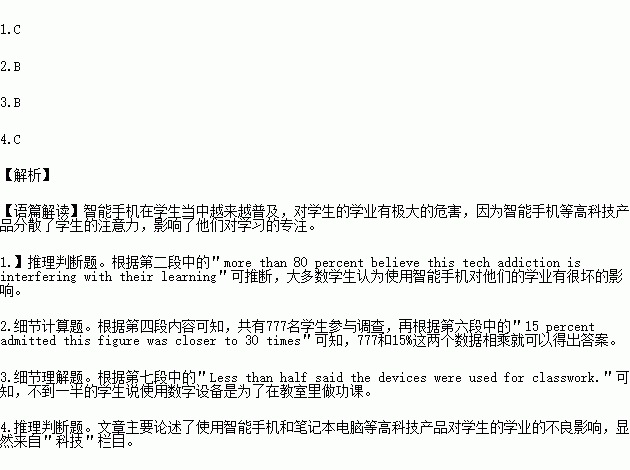题目内容
B
The rise in smartphones (智能手机) among young people may be having a direct effect on how successful they become as adults.
Research from the University of Nebraska Lincoln has discovered university students check their phones 11 times per lesson on average, and more than 80 percent believe this tech addiction is interfering with their learning.
A quarter of students across five American states also blamed poor grades in exams specifically on the fact that they used mobile devices when they should have been concentrating and revising and these grades could determine the jobs they end up going into.
Barney McCoy, an associate professor of broadcasting at the university, surveyed 777 students at six universities across five states about how they used digital devices in the classroom.
The students were from UNL, the University of Nebraska Lincoln at Omaha in Nebraska, Morningside College in Iowa, the University of North Carolina, the University of Kansas and the University of Mississippi.
Around two thirds said they used phones, tablets and laptops for "non-classroom purposes" up to ten times during a typical university day, while 15 percent admitted this figure was closer to 30 times.
Among the top reasons why 55 percent of students checked their devices so regularly were staying connected and fighting boredom. Less than half said the devices were used for classwork.
Texting was the most popular distraction (娱乐) technique at 86 percent, while 68 percent said they used their phones to check personal emails. Two thirds used social networks, 38 percent surfed the web and 8 percent admitted playing games when they should have been studying.
Despite eight out of ten students admitting their devices were distracting, fewer than five percent considered it to be a "very big" distraction.
"I don’t think students necessarily think it’s a big problem," said McCoy. "They think it’s part of their lives."
1.The majority of the students think that using smartphones __________.
A. helps to improve their grades
B. contributes to their poor grades
C. has a bad effect on their study
D. determines their jobs in the future
2. How many students surveyed used digital devices for "non-classroom purposes" about 30 times during a day?
A. About 518. B. About 116.
C. About 427. D. Less than 388.
3. Which of the following is TRUE?
A. Barney McCoy surveyed 777 students at the university he works in.
B. A minority of the students said they used digital devices for classwork.
C. Around two thirds admitted they used digital devices because lessons were boring.
D. Barney McCoy doesn’t think students’ using digital devices is a big problem.
4.The text is most likely to be found in a section about __________.
A. successful people B. political systems
C. science and technology D. historical events
选词填空
have trouble with settle down fall in love with communicate with get tired of join in get along with pack up |
1. She ____________________ a foreigner and married him when she studied in America.
2. He ____________________ his English study, so he often fails his English exam.
3. How is he ____________________ his new classmates?
4. I’m going to ____________________ their discussion.
5. With his help, I can ____________________ the police in English.
6. Few students ____________________ playing games.
7. Do you need me to help you ____________________ the oranges?
8. He has ____________________ in America after he moved there.
用方框中所给短语的适当形式填空
congratulate…on do damage to in honour of give out judging by |
1. ______ his accent, he may be from my hometown.
2. Many volunteers ______ food in the area hit by the earthquake.
3. The stadium was named ______ the club’s first chairman.
4. She ______ me warmly ______ my exam results.
5. The earthquake ______ the area where many houses fell down and many people were trapped in ruins.

